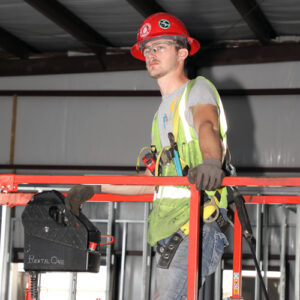Introductory Course
Introduction to the Fire Sprinkler Industry Class
Location: Richardson, Texas
Cost: Free
 This introductory course is designed to provide participants with a comprehensive overview of the fundamental principles, types of sprinklers, components, and functionality of sprinkler systems. It serves as a valuable resource for all individuals new to the protection industry (administrative, sales, estimation, inspection, testing & maintenance, design, and facilities managers) and professionals seeking to enhance their knowledge and skills in this specialized field.
This introductory course is designed to provide participants with a comprehensive overview of the fundamental principles, types of sprinklers, components, and functionality of sprinkler systems. It serves as a valuable resource for all individuals new to the protection industry (administrative, sales, estimation, inspection, testing & maintenance, design, and facilities managers) and professionals seeking to enhance their knowledge and skills in this specialized field.
During this course, participants will explore the critical role that sprinkler systems play in fire protection and life safety. Participants will gain insight into the underlying principles of fire dynamics, examine roles that make up the fire sprinkler industry, identify specific functions and applications within various occupancies, and explore resources that enhance this knowledge and experience. The course will include an introduction to the basic codes and standards, as well as demonstrations and hands-on activities.
Apprentice Training
Location: Remote Learning
Cost: Varies

AFSA’s Sprinkler Fitting Apprenticeship Training Series
Earn While You Learn
This is the premier choice for fire protection contractors seeking quality apprenticeship training for new installers. This four-level series is written by contractors for contractors.
The Sprinkler Fitting series has evolved over 40+ years to guide employers’ instruction of apprentices on best practices for the installation of water-based fire protection systems. The curriculum is comprised of printed textbooks for student study, online assessments, and digital instructor resources.
Beginning Design School
Location: Richardson, Texas
Cost: Varies
 The Beginning Design School presents a comprehensive, practical approach to preparing fire sprinkler system drawings. Over a three-week period, students will attend six live webinars studying and reviewing the installation and design approach requirements of NFPA 13 (2022) while completing self-paced exercises and module assessments. Q&A sessions and open discussions will also be included as part of the online instruction. The second part of the class will be a week of in-person training, preparing fire sprinkler system layout, shop drawings, and hydraulic calculations by hand. The course concludes with a comprehensive exam of the class content including the installation requirements and hydraulics. There is no CAD or third-party software taught in this class.
The Beginning Design School presents a comprehensive, practical approach to preparing fire sprinkler system drawings. Over a three-week period, students will attend six live webinars studying and reviewing the installation and design approach requirements of NFPA 13 (2022) while completing self-paced exercises and module assessments. Q&A sessions and open discussions will also be included as part of the online instruction. The second part of the class will be a week of in-person training, preparing fire sprinkler system layout, shop drawings, and hydraulic calculations by hand. The course concludes with a comprehensive exam of the class content including the installation requirements and hydraulics. There is no CAD or third-party software taught in this class.
Learning Objectives:
The school will prepare the student to:
- Accelerate the comprehension of plans and various types of building construction for proper sprinkler spacing applications.
- Determine the proper sprinkler system layout and installation requirements and methods.
- Interpret sprinkler specifications, plans (shop drawings), manufacturer’s technical data sheets, and flow tests.
- Identify sprinkler types, system types, pipe types, hangers, fittings, system components, etc.
- Explain the coordination with other trades — plumbing, mechanical, electrical, and structural.
- Prepare hand sprinkler drawings and hydraulic calculations and identify the hydraulic inputs to explain computer outputs.
Fire Protection Engineering Programs
California Polytechnic State University
San Luis Obispo, CA 93407; https://fpe.calpoly.edu/
Master of Science in Fire Protection Engineering
Cal Poly offers an online graduate program that leads to a Master of Science in Fire Protection Engineering degree. Students completing the program will possess the technical knowledge, skills and tools required to practice fire protection engineering in a variety of local, national and international settings. Upon completion of this program, students will possess the necessary knowledge and skills to pursue professional certification and licensure in the fire protection engineering discipline.
Cal Poly also offers two online graduate certificate programs. Both graduate certificate programs provide students with the knowledge, skills, and tools needed to solve fire protection engineering problems and to develop fire safety design solutions in a variety of professional settings. The FPE Applications graduate certificate program is a four course sequence that help students be successful as a fire protection engineer with a focus on the code-based or prescriptive requirements. The FPE Science graduate certificate program is a four course sequence that helps students be successful as a fire protection engineer with a focus on fire science. This understanding of fire science is applied to a performance-based analysis.
Case Western Reserve University
10900 Euclid Ave, Cleveland, OH 44106; www.case.edu
Master of Science Degree in Mechanical Engineering with Specialization in Fire Science and Engineering
Explore and learn how to apply the fundamental principles of fire protection engineering, fire behavior and dynamics, protection and suppression systems, polymeric materials structure and more.
Eastern Kentucky University
521 Lancaster Ave, Richmond, KY 40475; www.eku.edu
Bachelor of Science Degree in Fire Protection & Safety Engineering
Eastern Kentucky University is one of only a handful of colleges and universities in the nation to offer a comprehensive fire protection & safety engineering technology degree – and it’s available online. This unique program is ABET-accredited and prepares you to use your knowledge of fire prevention and suppression to design and recommend equipment to assist organizations in safeguarding life and property against fire, explosion, and related hazards.
Focused on leadership building and rooted in the latest science and technology, EKU Online’s fire protection & safety engineering technology degree provides the skills needed to understand how fire behaves, the best methods for preventing fires and how to minimize fire’s impact.
Benefits of EKU Online’s Bachelor of Science in Fire Protection & Safety Engineering Technology:
- Accredited by the Engineering Technology Accreditation Commission of ABET, abet.org
- Nationally renowned instructors are former fire chiefs, fire marshals, engineers, and investigators, recognized for their professional achievements and success in the field
- Free textbooks and course materials for undergraduate students beginning in Fall 2021
- Free online tutoring and career services assistance
- Accelerated 8-week terms
- Courses begin multiple times per year
- Generous credit transfer policy
- Reduced tuition for active-duty service members
- Dedicated advisor from application to graduation
Oklahoma State University
Stillwater, OK 74074; https://ceat.okstate.edu/det/fpset/
The Fire Protection and Safety Engineering Technology (FPSET) Bachelor of Science Program
The Fire Protection and Safety Engineering Technology (FPSET) Bachelor of Science program began at Oklahoma State University in 1937. The FPSET curriculum prepares graduates to assess risk and reduce loss potential in a variety of applications. The demand by business and industry for risk control specialists has resulted in the evolution of the program that now places emphasis on fire protection, safety, and occupational/environmental health. The FPST program prepares students for careers including fire protection engineering, systems design, safety specialists, or authorities having jurisdiction. Students receive a world-class education that includes applied learning through hands-on laboratory activities, emphasizing theoretical principles learned in the classroom.
Master of Science program in Fire Safety and Explosion Protection
Additionally, FPSET has a Master of Science program in Fire Safety and Explosion Protection, a natural extension of the Bachelor of Science program, preparing students for research or professional practice in fields such as fire protection engineering, explosion protection, fire and explosion hazard control, and process safety. This program is designed for both those with a fire protection background or other engineering disciplines. Students have the opportunity to grow in their knowledge through either a creative component or thesis route.
University of Maryland, College Park
College Park, MD 20742; fireprotection.umd.edu
Fast Track Your Career in the Fire Protection Engineering Industry
Trained fire protection experts are in high demand and a masters or professional certificate in fire protection engineering from the University of Maryland’s A. James Clark School of Engineering will prepare you to start an exciting new career or advance in your current career. Maryland Applied Graduate Engineering offers courses taught by the university’s foremost experts in fire protection engineering as well as international experts from business and industry.
Advisors work with admitted students to develop a course of study tailored to students’ professional interests. Students also choose whether to complete their coursework completely online or on campus at the University of Maryland in College Park, Md. Fire protection engineering courses offered explore basic processes of fire behavior, prediction of fire development, the combustion of materials and furnishings, the effects of fire on structures and the environment, smoke management, evacuation and tenability analysis and the law.
Help fund your education with need-based loans, work-study and grants, available for citizens and permanent residents, as well as administrative graduate assistantships.
University of North Carolina at Charlotte
9201 University City Blvd, Charlotte, NC 28223; www.uncc.edu
Bachelor of Science Degree in Fire Protection Engineering Technology
The Fire Protection Engineering Technology program at UNC Charlotte is one of a few programs in the United States that offers a curriculum that prepares students to join the workforce as a fire protection engineer or technologist. The courses offered in FPET focus on core competencies of a fire protection engineer including Fire Science, Fire Protection Systems, Fire Protection Analysis, Human Behavior and Evacuation.
Graduates of fire protection engineering programs can serve in various roles in industry due to the interdisciplinary nature of the field. These roles include but are not limited to fire consultants, fire and explosion investigators, and fire protection engineers or technologists. Also, you can find fire protection engineers or technologists working as government employees or in fire departments, fire equipment and system manufacturers, facilities managers, insurance industry representatives, research laboratories, university staff etc.
Worcester Polytechnic Institute
100 Institute Road, Worcester, MA, 01609;
www.wpi.edu
M.S. / Ph.D. in Fire Protection Engineering
WPI's Fire Protection Engineering Department drives significant cutting-edge research. It develops real-world solutions to contemporary fire safety problems through its state-of-the-art fire laboratories. Its graduates are highly trained, influential, in-demand experts—are you ready to become one?
Several online and on-campus graduate programs offer flexibility for those seeking a degree in fire protection engineering.
Learn from internationally renowned faculty who are recognized for their innovative research, professional practice-oriented curriculum, and their focus on making the world safer. Tackle challenging questions about fire behavior and our response to it. Students in the campus-based programs work in advanced facilities. Online students can practice out in the field immediately applying their coursework to real-world challenges. All students work to gain and create knowledge that informs and shapes regulatory policy, building and system design, industrial processes, first responder operations, and product performance standards.
Thesis and non-thesis options are available, and global internships are available to part- and full-time students. Learn more to find the right program for you.
AFSA ITM Inspector Development Program
Overview
The AFSA ITM Inspector Development Program utilizes a blended learning format with on-demand lessons, webinars, and in-person training. The training course is combined with a robustly structured on-the-job training (OJT) and mentoring program, with the goal that candidates pass the NICET Level II water-based inspection certification exam in less than two years.
Details
- 56 hours of on-demand courses
- 22 hours of live, interactive web instruction
- Live in-class lecture
- Hands-on field and lab inspections and testing training
- Limited class size maximizing student learning outcomes
- Provide a guided and systematic process for the ‘green’ inspector trainee toward NICET I and NICET II certifications
- Encourage and foster character-building traits: honesty, integrity, confidence, professionalism, neat appearance, organization, reliability, accountability, and credibility.
- Strengthen communication skills, both written (for noting inspection and testing observations) and verbal (communicating with customers)
- Training and development program developed by seasoned industry experts with 65+ years of combined industry experience and 50+ years of teaching the fire protection community around the globe
Students Become NICET Level II Ready in 20 Months
AFSA ITM Program graduates achieve a 93% pass rate on NICET Level I & II exams*, exceeding the national average of 60%.

